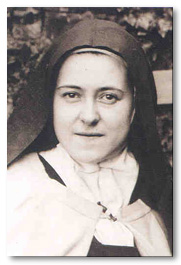St Therese of Lisieux (1873-1897) was not formally educated.
She did not write theological dissertation, or treatises on the life of prayer
and virtue. All that represents her thought to us is an informal autobiography,
a collection of poetry and drama, and her correspondence. Why is it, then, that
she was made a Doctor of the Church by St John Paul II in 1997?
St John Paul II, in his Apostolic Letter Divini Amoris Scientia which officially
declared St Therese a Doctor, admits that “in the writings of Therese we do not
find perhaps, as in other Doctors, a scholarly presentation of the things of
God.” But we do find in her writings “an enlightened witness of faith, which,
while accepting with trusting love God’s merciful condescension and salvation
in Christ, reveals the mystery and holiness of the Church.” 1
In Therese’s day the subtle heresy of Jansenism had
contributed to a widespread view of a God who is violent and punitive,
demanding acts of self-violence in atonement for sins. 2 In our modern era,
which is so marked by violence at every level of human existence, this view of
God makes Christianity most unappealing. What Therese offers the modern world
is the Gospel truth that “God’s love is without violence”, and Jesus wills that
“all his children love him, themselves, and one another without violence.”3 In
this way, Therese “has made the Gospel shine appealingly in our time”. 4
1 Apostolic Letter of John Paul II, Divini Amoris Scientia
2 Cf New Catholic
Encyclopedia vol.7, “Jansenism”, (McGraw Hill, New York, 1967) pg. 825
3 Joseph F. Schmidt,
FSC, The Gospel According to St. Therese (Word
Among Us, Guilford,2017) pp.52-53
4 Apostolic Letter of John Paul II, Divini Amoris Scientia

No comments:
Post a Comment